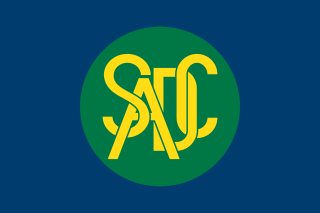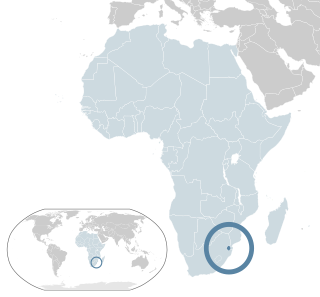
The economy of Botswana is currently one of the world's fastest growing economies, averaging about 5% per annum over the past decade. Growth in private sector employment averaged about 10% per annum during the first 30 years of the country's independence. After a period of stagnation at the turn of the 21st century, Botswana's economy registered strong levels of growth, with GDP growth exceeding 6-7% targets. Botswana has been praised by the African Development Bank for sustaining one of the world's longest economic booms. Economic growth since the late 1960s has been on par with some of Asia's largest economies. The government has consistently maintained budget surpluses and has extensive foreign-exchange reserves.

The economy of Lesotho is based on agriculture, livestock, manufacturing, mining, and depends heavily on inflows of workers’ remittances and receipts from the Southern African Customs Union (SACU). Lesotho is geographically surrounded by South Africa and is economically integrated with it as well. The majority of households subsist on farming. The formal sector employment consist of mainly female workers in the apparel sector. While male migrant laborers work primarily as miners in South Africa for 3 to 9 months and employment in the Government of Lesotho (GOL). Half of the country's population work in informal crop cultivation or animal husbandry.

The economy of Malawi is $7.522 billion by gross domestic product as of 2019, and is predominantly agricultural, with about 80% of the population living in rural areas. The landlocked country in south central Africa ranks among the world's least developed countries. In 2017, agriculture accounted for about one-third of GDP and about 80% of export revenue. The economy depends on substantial inflows of economic assistance from the IMF, the World Bank, and individual donor nations. The government faces strong challenges: to spur exports, to improve educational and health facilities, to face up to environmental problems of deforestation and erosion, and to deal with the problem of HIV/AIDS in Africa. Malawi is a least developed country according to United Nations.

Eswatini, officially the Kingdom of Eswatini and formerly named Swaziland, is a landlocked country in Southern Africa. It is bordered by Mozambique to its northeast and South Africa to its north, west, south, and southeast. At no more than 200 kilometres (120 mi) north to south and 130 kilometres (81 mi) east to west, Eswatini is one of the smallest countries in Africa; despite this, its climate and topography are diverse, ranging from a cool and mountainous highveld to a hot and dry lowveld.
The economy of Eswatini is fairly diversified. Agriculture, forestry and mining account for about 13 percent of Eswatini's GDP whereas manufacturing represent 37 percent of GDP. Services – with government services in the lead – constitute the other 50 percent of GDP.

Eswatini is a member of the United Nations, the Commonwealth of Nations, the African Union, the Common Market for Eastern and Southern Africa, and the Southern African Development Community. Currently, the Kingdom of Eswatini maintains 11 embassies and High Commissions along with 15 consulates and other representations around the world, while there are five embassies and High Commissions in Eswatini as well as 14 consulates and other representations.

Mbabane is a city in Eswatini, and is one of the two capitals, serving as the executive capital.

Mswati III is the king of Eswatini and head of the Swazi royal family. He was born in Manzini in the Protectorate of Swaziland to King Sobhuza II and one of his younger wives, Ntfombi Tfwala. He was crowned as Mswati III, Ingwenyama and King of Swaziland, on 25 April 1986 at the age of 18, thus becoming the youngest ruling monarch in the world at that time. Together with his mother, Ntfombi Tfwala, now Queen Mother (Ndlovukati), he rules the country as an absolute monarch. Mswati III is known for his practice of polygamy and currently has 15 wives.

Southern Africa is the southernmost subregion of the African continent, south of the Congo and Tanzania. The physical location is the large part of Africa to the south of the extensive Congo River basin. Southern Africa is home to a number of river systems; the Zambezi River being the most prominent. The Zambezi flows from the northwest corner of Zambia and western Angola to the Indian Ocean on the coast of Mozambique. Along the way, the Zambezi River flows over the mighty Victoria Falls on the border between Zambia and Zimbabwe. Victoria Falls is one of the largest waterfalls in the world and a major tourist attraction for the region.

The Southern African Development Community (SADC) is an inter-governmental organization headquartered in Gaborone, Botswana.

The Southern African Customs Union (SACU) is a customs union among five countries of Southern Africa: Botswana, Eswatini, Lesotho, Namibia and South Africa. Its headquarters are in the Namibian capital, Windhoek. It was established in 1910.
Lobamba is a city in Eswatini, and is one of the two capitals, serving as the legislative, traditional, spiritual, seat of government of the Parliament of Eswatini, and Ludzidzini Royal Village, the residence of Queen Ntfombi, the Queen Mother.
Child labour in Eswatini is a controversial issue that affects a large portion of the country's population. Child labour is often seen as a human rights concern because it is "work that deprives children of their childhood, their potential and their dignity, and that is harmful to physical and mental development," as defined by the International Labour Organization (ILO). Additionally, child labour is harmful in that it restricts a child's ability to attend school or receive an education. The ILO recognizes that not all forms of children working are harmful, but this article will focus on the type of child labour that is generally accepted as harmful to the child involved.
Education in Eswatini includes pre-school, primary, secondary and high schools, for general education and training (GET), and universities and colleges at tertiary level.
HIV/AIDS in Eswatini was first reported in 1986 but has since reached epidemic proportions. As of 2016, Eswatini had the highest prevalence of HIV among adults aged 15 to 49 in the world (27.2%).

Eswatini–South Africa relations refers to the current and historical relationship between Eswatini and South Africa. South Africa surrounds Eswatini on the north, west and south. The two states share strong historical and cultural ties. Mutual High Commissions were established in Pretoria and Mbabane at the end of the apartheid era in 1994. Eswatini's High Commission in Pretoria is also cross-accredited to Botswana, Lesotho, Namibia, Zambia and Zimbabwe.

Since the end of apartheid, foreign trade in South Africa has increased, following the lifting of several sanctions and boycotts which were imposed as a means of ending apartheid.

Eswatini–India relations refers to the international relations that exist between Eswatini and India. India also maintains a resident High Commission in Mbabane established on 13 August, 2019. Eswatini does not have a diplomatic mission in India.

The history of the Jews of Eswatini, formerly Swaziland.

















